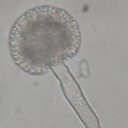PRAS40 deregulates apoptosis in Ewing sarcoma family tumors by enhancing the insulin receptor/Akt and mTOR signaling pathways.
Keywords
Abstract
EWS expression in Ewing sarcoma family tumors (ESFTs) is decreased due to the haploinsufficiency elicited by chromosomal translocation. The abnormal expression levels of EWS and its downstream factors contribute to the manifestation of ESFTs. Previously, we reported that increased Proline-rich Akt substrate of 40 kDa (PRAS40), which is encoded by an EWS mRNA target, promotes the development of ESFTs. However, the mechanism remains elusive. To clarify the role of PRAS40 in ESFTs, we silenced PRAS40 expression in ESFT cells using siRNAs and found increased levels of terminal deoxynucleotidyl transferase dUTP nick end labeling (TUNEL)-positive cells. Cleaved caspase 3 levels and cytochrome C release were increased simultaneously. Furthermore, with PRAS40 knockdown, the phosphorylation of Akt and mTOR downstream factors, i.e., S6K and S6, was attenuated notably. Ectopic expression of PRAS40 increased Akt and S6 phosphorylation. Activation of Akt only partially reversed the apoptosis induced by PRAS40 knockdown, and downregulation of S6 phosphorylation by PRAS40 silencing could not be sufficiently restored via Akt activation. Searching the upstream factors in this pathway, the autophosphorylation of insulin receptor (IR) was found to be inhibited significantly by PRAS40 silencing but increased by PRAS40 overexpression. Therefore, PRAS40 may enhance IR phosphorylation to facilitate Akt and mTOR signaling leading to the apoptosis deregulation in ESFTs. Moreover, in vivo results confirmed that PRAS40 deletion suppressed the growth of ESFT xenografts and downregulated IR and S6 phosphorylation. Our findings suggest a novel functioning model for PRAS40, which represents a novel therapeutic target for ESFTs.


